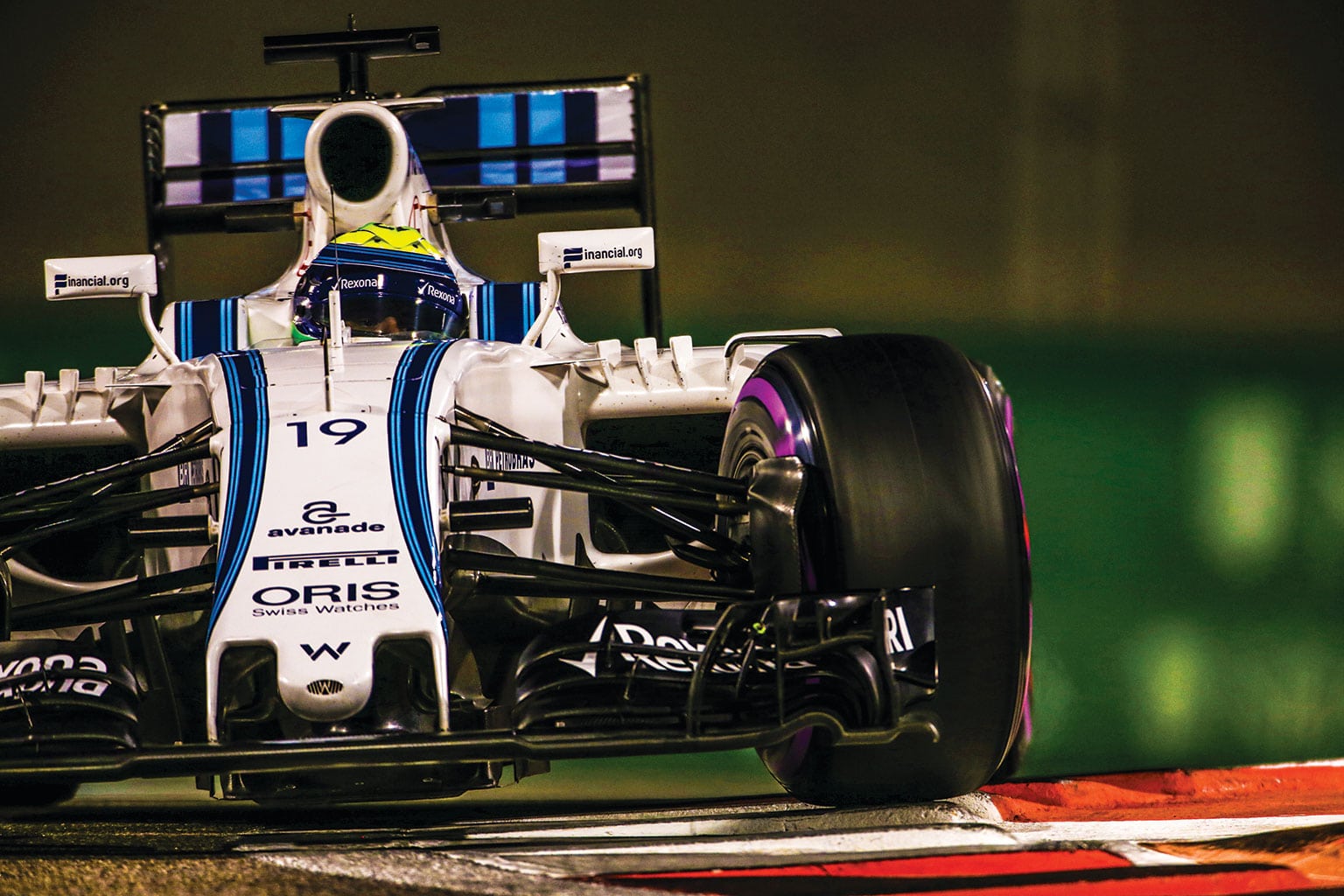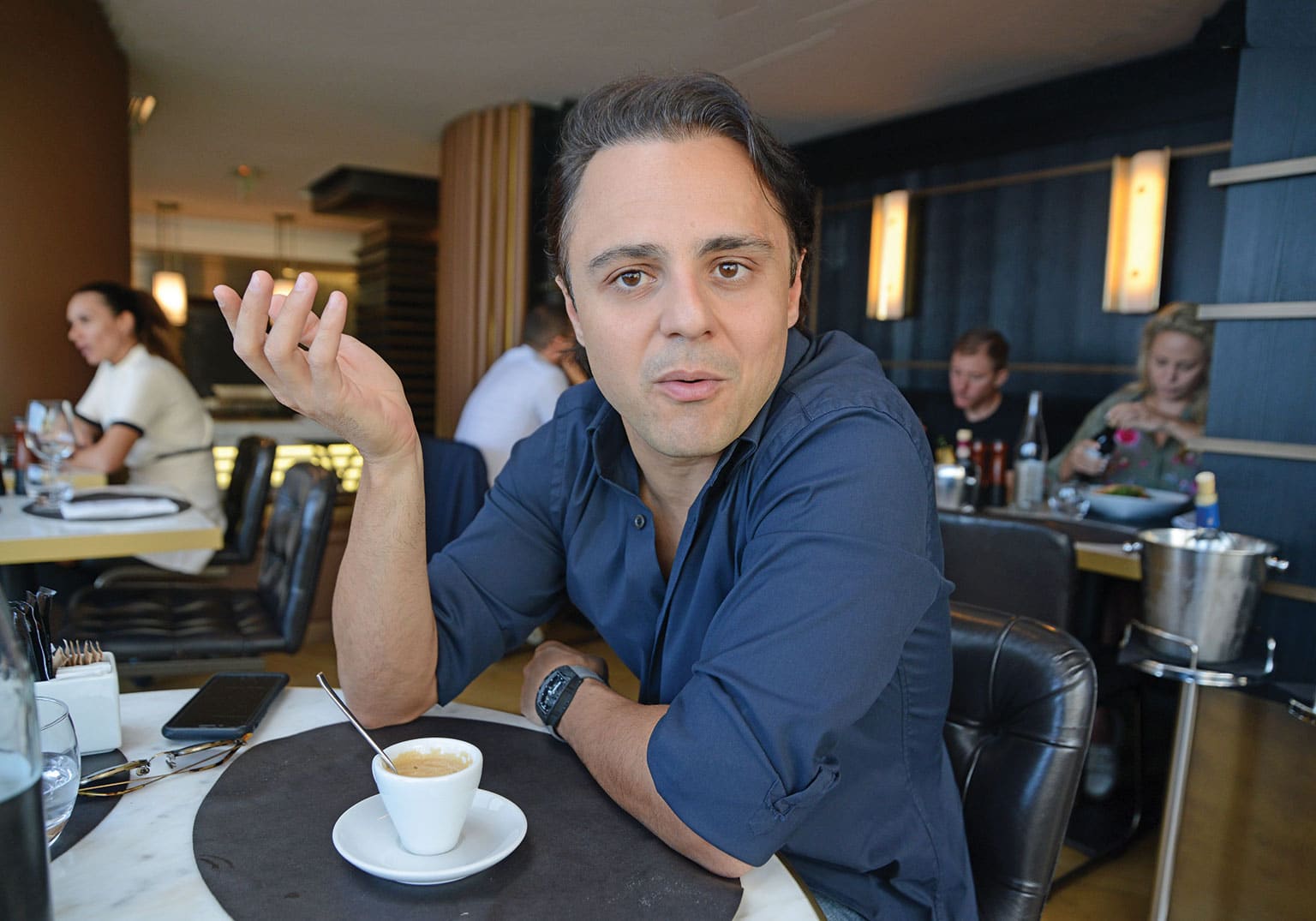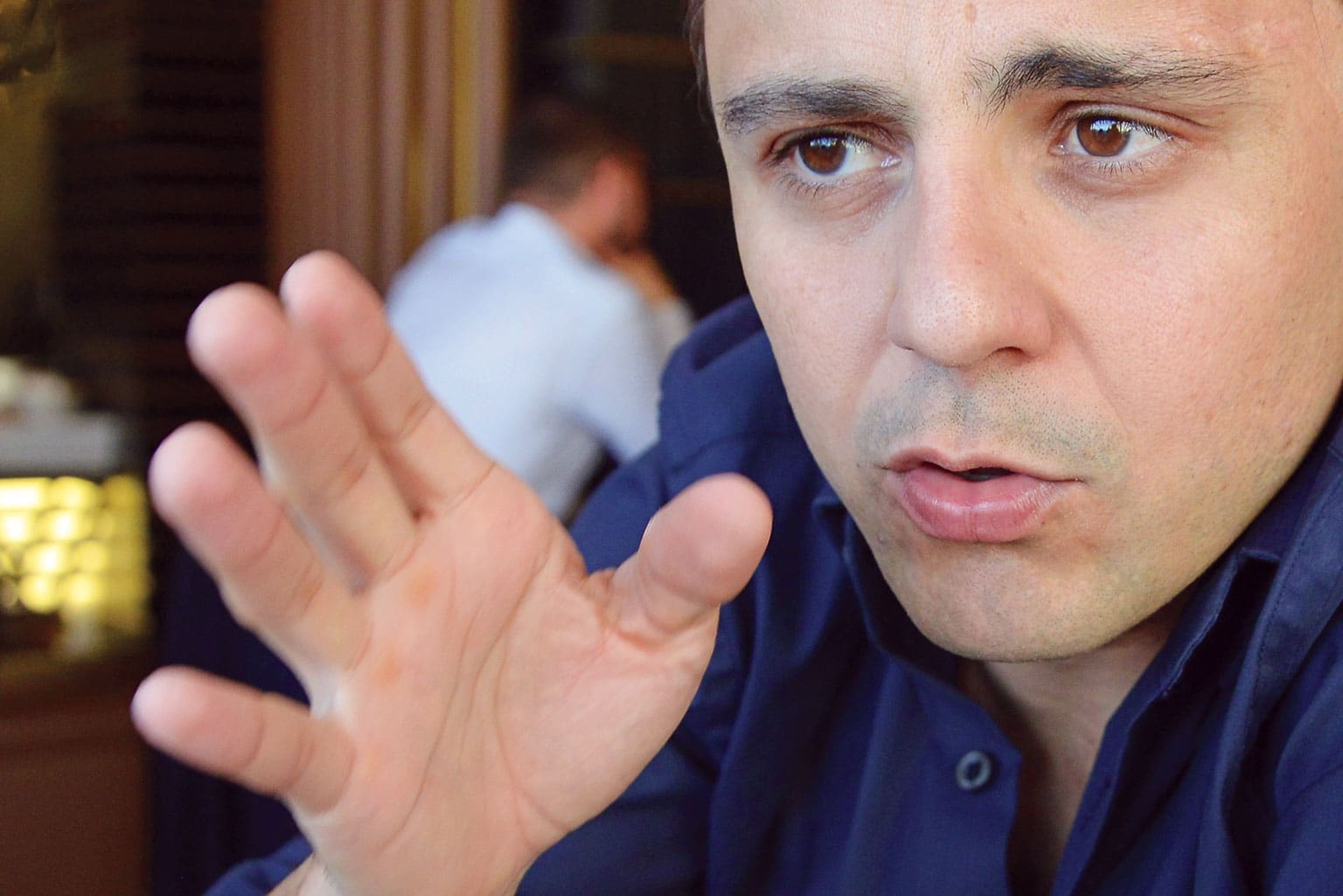Lunch with... Felipe Massa
After 15 seasons in Formula 1, 11 GP wins and a close encounter with the world title, the popular Brazilian seeks a change in a new arena
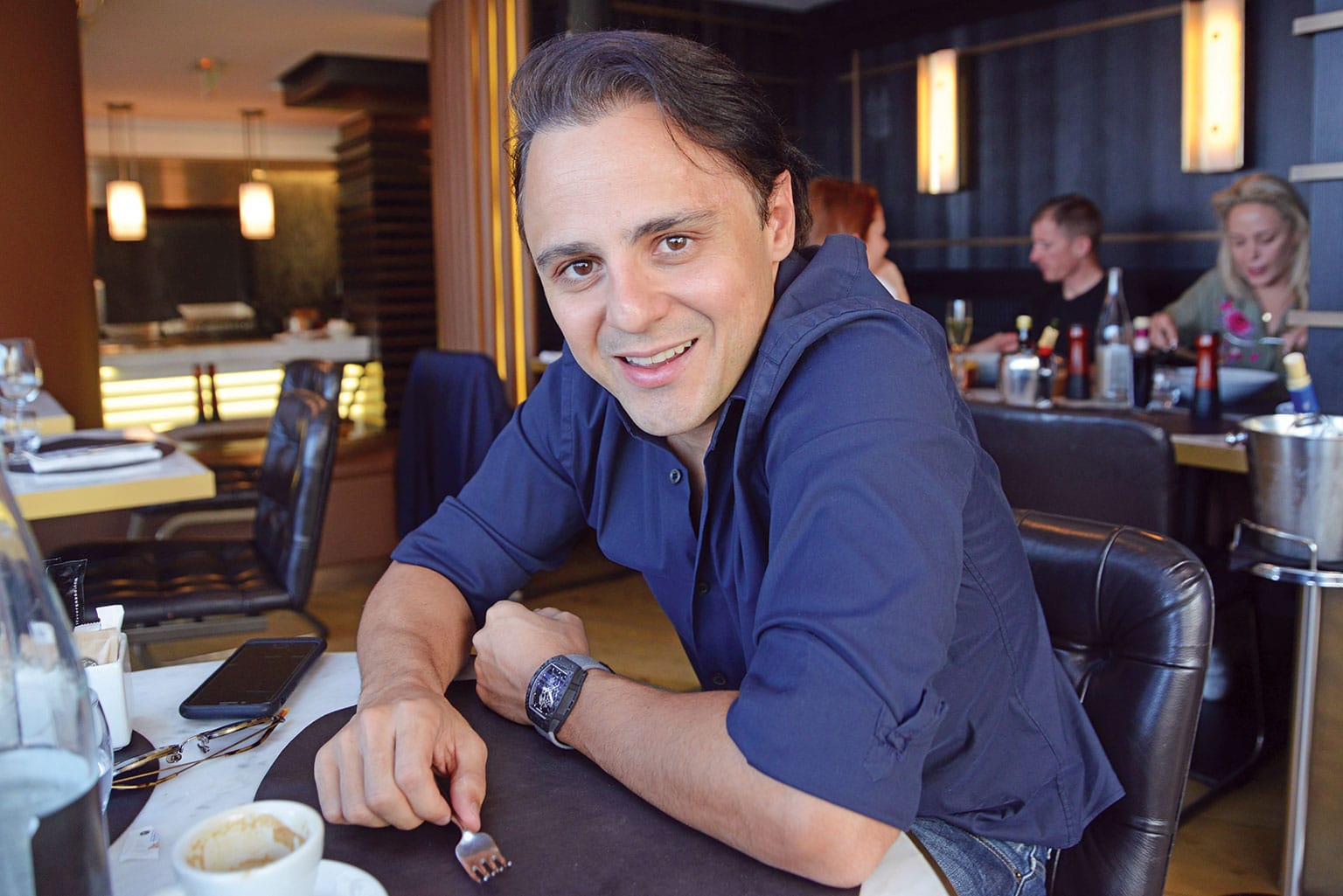
Lyndon McNeil
The Brazilian arrives with wife Raffaela, orders himself two salads – salmon for his main course, fruit to follow – and signs off with a coffee. We’re talking a couple of weeks before he confirms his retirement from F1 for the second time in as many seasons. “As far as I’m concerned,” he says, “I did enough in 2017 to justify my place in F1 and given the choice I’d like to stay with Williams for another season. I’m aware that might not be possible, though, in which case I’ll look for options elsewhere in the sport. I definitely want to carry on racing.”
It’s what he has done from a very early age.
“It all started because of my dad,” he says. “His name is Luiz Antonio, though everybody calls him ‘Titonio’. He raced touring cars for fun in Brazil and I used to watch him as a small kid. He also took me to watch F1 practice at Interlagos in 1986 or ’87. When I was about six he bought me a 50cc motocross bike and that was it – I fell completely in love with the sport and decided I wanted to be a motocross rider. After a couple of years, though, I was starting to become a bit too crazy with the bike and that was a worry for him, so he took me to a kart school in São Paulo – and as soon as I drove one I fell in love all over again: now I wanted to be a racing driver. He then bought me a kart, with which I practised for a few months before starting to race at the age of eight.
“My father was my biggest inspiration. Like everyone else I was a fan of Ayrton Senna, but I didn’t want to start racing because of Senna. I wanted to race because of my dad.”
He raced karts at national level into his teens and was then given a choice. “It was never easy to attract sponsors,” he says. “That was always the hardest part for us, but my dad used to do a few deals here and there. In 1996 he gave me two options: he said we could carry on karting with a low budget, or we could set aside the money for three tests in Formula Chevrolet [the local equivalent of Formula Vauxhall Lotus] and I decided to do that, so I drove a single-seater for the first time when I was 15.”
He returned to karting in 1997, then undertook half a season in Formula Chevrolet the following year and did well enough to take fifth in the final standings. That led to the offer of a drive with RC Motorsport, a team that had never previously won the title, but Massa proved to be a catalyst for its first such success.
“Afterwards I started looking at Europe and everybody was telling me I should go to England for the sake of my career,” he says, “but people were asking less money for a season in Italy so, purely for financial reasons, I went there instead. The going rate for a year in Formula Renault was $160,000. My father managed to find $100,000 through friends and contacts. That wasn’t enough for the season, so I signed with Cram Competition for six Italian races – plus two rounds of the European Championship, which took place on the same weekends. If I didn’t find the rest of the money, my career would probably be finished.
“My team-mate was Augusto Farfus and we shared a small house the team owned in Caslino d’Erba. I did three tests with the previous year’s car during the winter and broke two track records. Then at the start of the season I won the first Italian race and also the first European round I contested, so I found myself fighting for both titles even though I didn’t have the budget to challenge properly for either of them. At that stage the team started to help me. I gave them any prize money I earned and we picked up bits of help here and there, so ultimately I was able to complete both championships – and I won them. At the end of the year I received two new cars – a Renault Clio Sport for winning the Italian championship and a Laguna for the Eurocup. I gave both to the team, to cover some of what I owed.
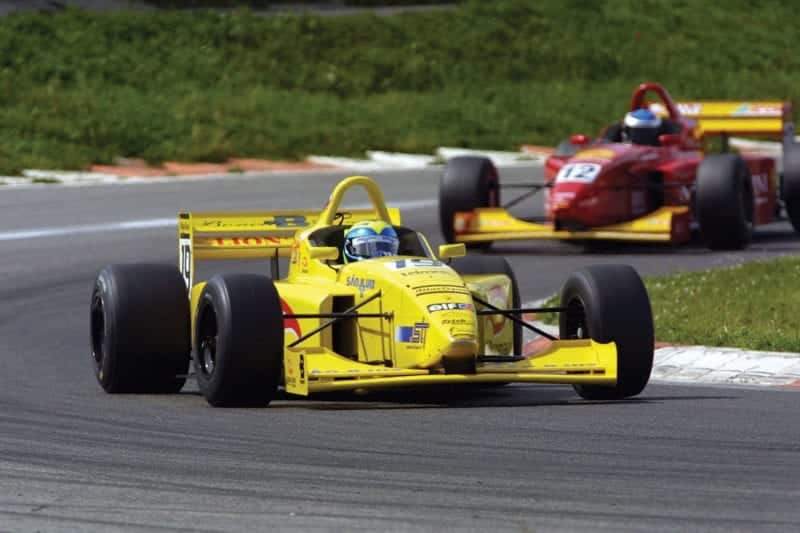
For his second year in Europe, Massa drove for Draco in the Italy-based Euro F3000 series. He won six of eight races to take the title
Motorsport Images
“At that stage I also began to receive interest from F1 teams – Flavio Briatore, Toyota and also Pedro Diniz, who had a stake in Prost at that time. They all wanted me to sign a contract, but Toyota was still building up its F1 operation and was offering me a deal through Prema, with whom I’d have been racing in F3 alongside Ryan Briscoe. I said, ‘Listen, if you want to sign me I want to deal directly with Toyota, not Prema.’ So that didn’t happen and they recruited Franck Perera instead. Briatore was keen for me to race for him in German F3, but at that point I had two managers – and one of them was Adriano Morini, from Draco Racing. He wanted me to drive in the Euro F3000 series – so it was in his interest that I didn’t agree to an F3 deal – and I decided to stick with him. The reason I didn’t sign for Diniz? He wanted too big a stake in my future earnings!
“I began racing in F3000 with Draco, won the first race at Vallelunga and Morini then took me to meet a Ferrari sponsor, somebody who knew Jean Todt very well. He subsequently arranged for me to meet Jean, who asked lots of questions. He said, ‘I have no interest in you at the moment, but win the championship and I’ll talk to you again’.”
Run for chassis previously pensioned off by the FIA F3000 series, and based largely in Italy, Euro F3000 had nothing like the strength in depth of its more cosmopolitan namesake, but Massa did as Todt had asked, winning six of the eight races and accumulating almost twice as many points as his closest rival. “Jean subsequently signed me to a young-driver contract – the first one Ferrari had done, I believe, and at the time it was all kept a big secret. I agreed to an eight-year deal. It didn’t mean I was going to race for Ferrari, but then McLaren signed Kimi Räikkönen, Peter Sauber was looking for another young driver to replace him and through my Ferrari connection I was invited to test at the end of the season.”
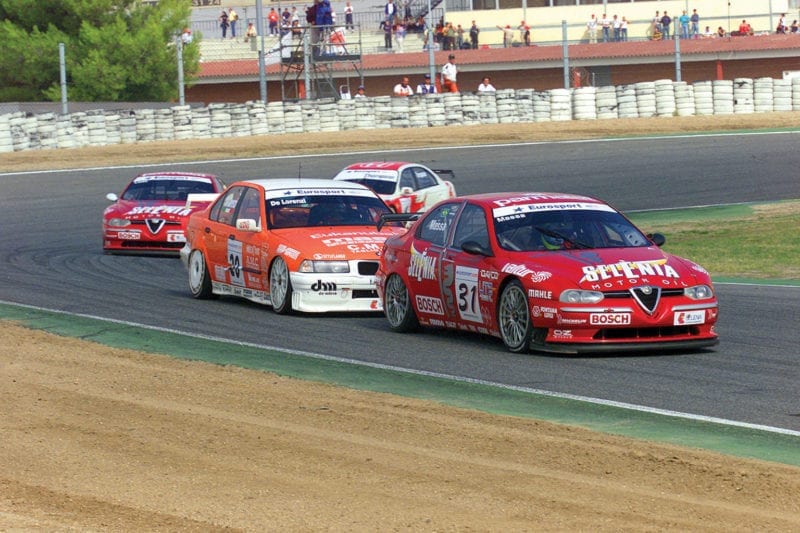
Massa appeared twice for Alfa Romeo in the European Super Touring Car Championship , finishing sixth at Jarama on his debut
Motorsport Images
That went well and, two years after arriving in Europe with enough money to do a partial Formula Renault campaign, Massa had landed his first F1 race seat without having ventured anywhere near F3 or the mainstream F3000 series. Was he ready for F1?
“Definitely not!” he says. “I was quick enough, but made too many mistakes. I was 20 and didn’t have enough experience – I was definitely better prepared when I returned in 2004, after a year of testing with Ferrari. Even so, I scored some good points early in 2002 – and that’s when they were ‘proper’ points, awarded only to the first six…
“In the first half of the year I was really quick, but I crashed a lot and Peter Sauber hated that. In the middle of the season he made up his mind to hire Heinz-Harald Frentzen, just because of my accidents. In the second part of the year I drove much better, although by then the car wasn’t as competitive as it had been. I managed to get a couple of seventh places and gradually became a bit quicker than [team-mate] Nick Heidfeld. At the end of the year Peter said, ‘I don’t know if I’m doing the right thing by replacing you, but the decision was taken in August.’
“I thought maybe my career was finished – having one chance to race in F1 is already very difficult, so getting a second… It’s almost impossible.”
Fortunately he had his long-term Ferrari deal, which led to him taking up a third-driver role with the Scuderia in 2003. “That benefited me a lot,” he says. “I was out in the car almost every week, working with and learning from Michael Schumacher and Rubens Barrichello. It was a very important year for me, in terms of gaining experience and becoming a proper Formula 1 driver – not in terms of speed, but in terms of understanding the technical side, set-ups that suited my driving style, how to pace myself in races and so on.”
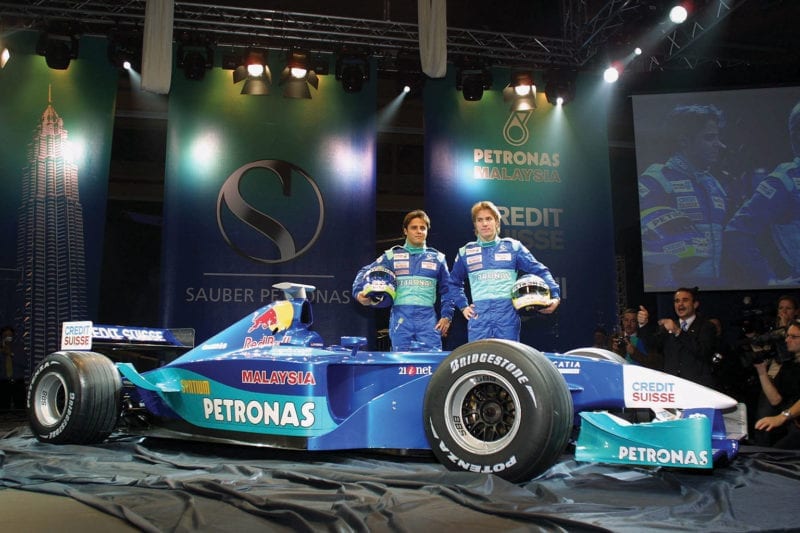
After winning three junior titles in two seasons, Massa joined Sauber alongside Nick Heidfeld
Motorsport Images
For 2004, he was back on board at Sauber.
“I felt like a different driver when I rejoined,” he says, “and I think that showed in my performances. Peter was happy with me, so I stayed for two years and late in 2005 he offered me a three-year deal to race for BMW, which was about to take over his team. It was a good contract, but there was also the option of replacing Rubens at Ferrari. I accepted a one-year deal there for far less money than I’d have received from BMW, but Ferrari paid good bonuses and eventually my results helped me earn more than I would have done at BMW. I knew when I signed that it might only be a one-year thing, because I’d been told that Kimi Räikkönen would be joining in 2007, so the only chance of prolonging my Ferrari career would be if Michael stopped – and it wasn’t until mid-season that I knew he’d be doing that. It had been a bit of a risky decision, but whatever happened I would at least come away having been a Ferrari driver for a season.”
And he was also a winner before the campaign was through. While Schumacher scored seven victories and duelled with Fernando Alonso for the world title, Massa finished consistently in the top five, recorded a number of podium finishes, took his first Grand Prix win in Turkey and signed off with a dominant victory on home soil, at Interlagos. In that race, his last with Ferrari, Schumacher pitted out of sequence after sustaining front wing damage and then charged back through the field to finish fourth – a memorable sign-off.
“In a way I had mixed feelings about him stopping,” Massa says, “because he’s such a great champion. But he’d also had a long career, even then, and had achieved so much. It was perfect, just amazing, and he was always going to have more to lose by coming back when he did. His decision was also a great boost for me – I’m confident I could have found another drive, and there was interest from other teams, but my primary hope was being able to stay with Ferrari. And I ended up doing that for another seven seasons…
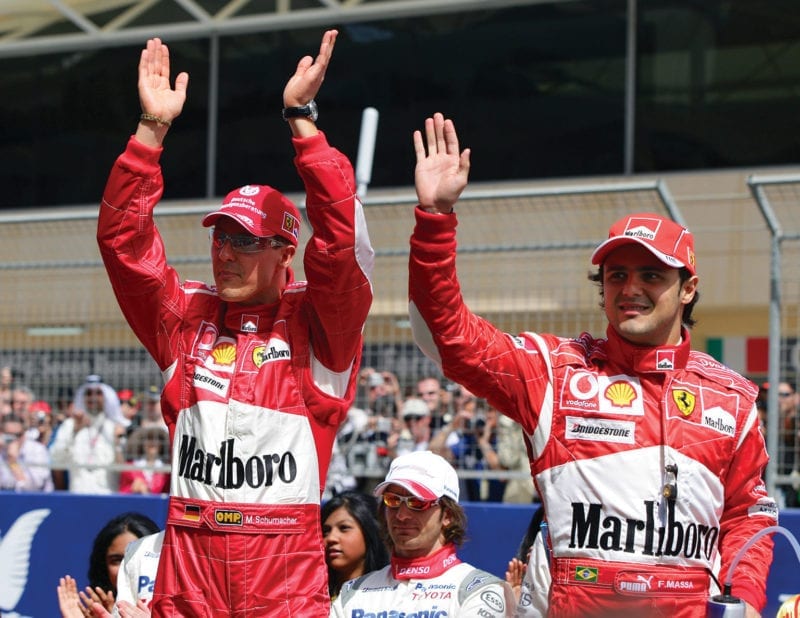
With Ferrari team-mate Michael Schumacher at Istanbul Park, scene of his maiden GP victory
Motorsport Images
“Michael was great for me because it was a bit like having a teacher in the other car. Sometimes he didn’t want to show me things – he was similar in that way to Fernando Alonso – but I was a relative unknown, at the beginning of my career, and regarded him as the master. He was very kind to me. I’d often say to him, ‘Listen, I just want to learn from you’ – but he could sometimes be a bit awkward if I was quicker than him! That’s just Michael.
“Overall, working with him was very important for me and I learned a lot. I struggled a bit in the first half of 2006, but after that our times were usually quite similar and sometimes I was quicker. It was a great experience.”
The dynamic changed significantly with the arrival of Räikkönen as Schumacher’s replacement.
“That made life better for me,” Massa says, “because Michael had more or less owned the team! Ferrari’s first interest had always related to Michael, irrespective of whether it was the right or wrong thing to do. The team always focused on Michael, 100 per cent. When Kimi arrived, I think the mentality was that he’d be the guy – but I actually had a better first half of the championship than he did and was leading him by a point after the Turkish Grand Prix. Then we went to Monza, where he finished third and I retired with a broken damper while I was running ahead of him. The team had decided that it would put its weight behind whichever of us was ahead in the championship after Spa, where Kimi did a better job than me – he won and I was second, which put him a few points clear. After that I let him win in Brazil, to clinch the title.
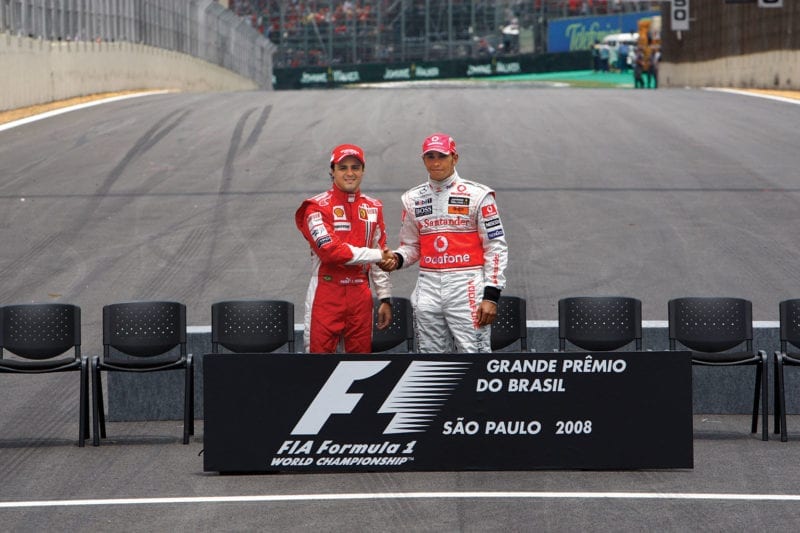
Pictured with rival Lewis Hamilton ahead of the 2008 showdown in Brazil. Massa won the race, but not the title
Motorsport Images
“The following season was great for me – I was usually quicker than him and it was the same in 2009 up until my accident in Hungary [he’d gone to Budapest with 22 points, more than twice as many as the Finn]. Even though he won the championship while we raced together, my statistics against him at Ferrari look good.”
And for a moment at Interlagos in 2008, many believed that Massa had likewise taken the title. He’d recorded the victory he needed in a chaotic, rain-affected race – and rival Lewis Hamilton had started the final lap in sixth, one position lower than he needed to be. But at Junçao, effectively the final corner of the season, Hamilton had more purchase than Timo Glock’s still dry-tyred Toyota and was able to nip ahead to gain the extra point he needed [level scores were no use to him, as Massa would have taken the title on a countback by dint of six victories to five].
The Brazilian – for whom this would be an 11th, and final, Grand Prix success – was already a popular figure within the sport, but his post-race dignity earned him worldwide admiration.
“I didn’t feel I had anything to be sorry about,” he says. “I’d won the race, so there was nothing more I could have done. It wasn’t my fault that I’d lost the title and that gave me a great deal of… not happiness, but satisfaction. I was measured about it because the title was lost as a result of various things that had happened beforehand – an engine failure during the closing stages in Hungary, a pit mix-up in Singapore – both of them when I was leading. I did a perfect job that weekend in Brazil – pole, fastest lap, a race win. I certainly didn’t lose the championship because of what happened there.
“Do I have any regrets? Definitely not. I mean, I realise that it would have been an amazing thing to win the championship at home, in São Paulo, an extraordinary thing for me and the whole country, but it clearly wasn’t meant to be.”
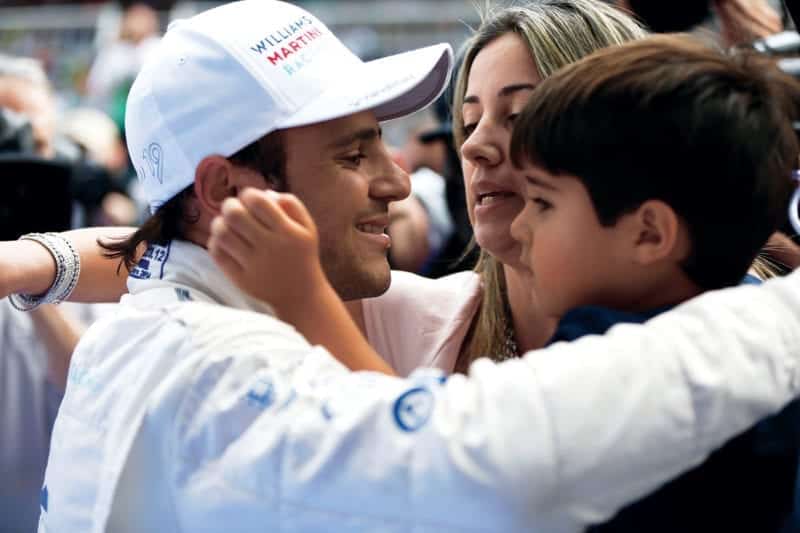
With wife Raffaela and son Felipinho at the 2014 Austrian GP where Massa upset the Mercs to steal pole
Motorsport Images
Another memorable element of that season was the look of utter bewilderment on Massa’s face when he appeared in the post-qualifying press conference at Monaco, having just taken pole. Was he genuinely as surprised as he looked?
“Absolutely!” he says. “I really couldn’t believe it. I had always struggled there in the past, with Sauber and in my first two years at Ferrari. Even though I finished on the podium in 2007, I wasn’t really happy with my performance. In 2008 I finally learned how to drive the track, finally understood what it took to do a good lap of Monaco. It was a result of Rob [Smedley, his race engineer] and I poring over the data, chatting about the best way to tackle each corner. It did take a few years to get my head around it, but after that – boom, I was always competitive.”
His final year as Räikkönen’s team-mate ended prematurely, when a damper spring parted company with Rubens Barrichello’s Brawn during qualifying in Hungary and struck Massa on the crash helmet. A couple of centimetres one way and it would have missed him, a couple the other and it might have killed him: the impact left him with a fractured skull.
“I remember Rubens disrupting my rhythm a bit,” he says. “I was coming towards the end of a flying lap and he was building up to one. I caught him in the final sector and lost a couple of tenths. I don’t remember anything beyond that, nothing about the accident and not a great deal about being in hospital. I was under very heavy sedation and it takes time to recover from that. Raffaela can probably tell you more about that time than I can…”
She is happy to fill in the gaps. “From time to time he would wake up in hospital and start talking to me, but I’m not sure he was really aware of his surroundings because all of a sudden he would fall asleep again. He was like that for quite a while.”
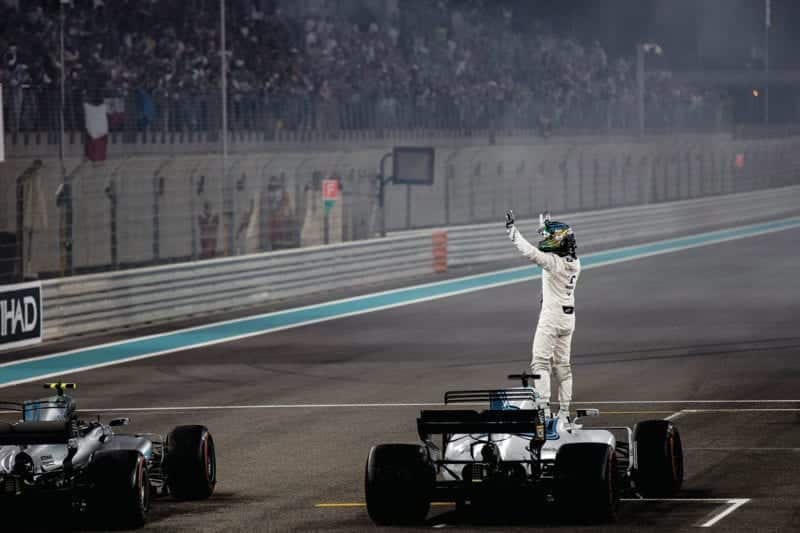
Waving goodbye – at least to F1 – at the 2017 Abu Dhabi GP
Motorsport Images
Massa nods. “I can recall doing an interview in the hospital – and I had to do it in three languages, Portuguese, Italian and English. That was a bit tricky, given how I was feeling. I also remember becoming aware of Raffaela and my family being there, and seeing my face in the mirror for the first time…
“Gradually I began to feel OK, even though my head was completely blue. But I understood what had happened and felt that everything would normalise in due course, that I’d be able to get back to doing what I’d being doing before – but until I got back in the car there was always a little bit of doubt about whether I’d be able to drive at the same level. I was constantly asking myself questions.
“My next experience was in the simulator, when everything felt OK, then by mid-October [little more than two months after the initial incident] I was back in a car at Fiorano. My doctor was there, keeping an eye on me, but things were OK. Everything felt normal as soon as I was back behind the wheel.”
Raffaela: “I think it probably helped his recovery that he had no idea the spring was coming: he didn’t realise it was there, that he was going to have an accident, so he was relaxed rather than tensed up. It was as though somebody had come up from behind and hit him over the head when he wasn’t expecting it.”
Massa still has the helmet he wore that day – complete with blood-stained lining. “It’s part of my life,” he says. “I keep it at my apartment in São Paulo and it’s like a trophy in some ways because it represents a victory of sorts: my survival.”
He returned to action at the start of 2010 – and qualified second for the Bahrain Grand Prix, the best part of four tenths quicker than newteam-mate Fernando Alonso. The Spaniard passed him at the first corner, however, a foretaste of where the balance of power would lie during their time together at the Scuderia.
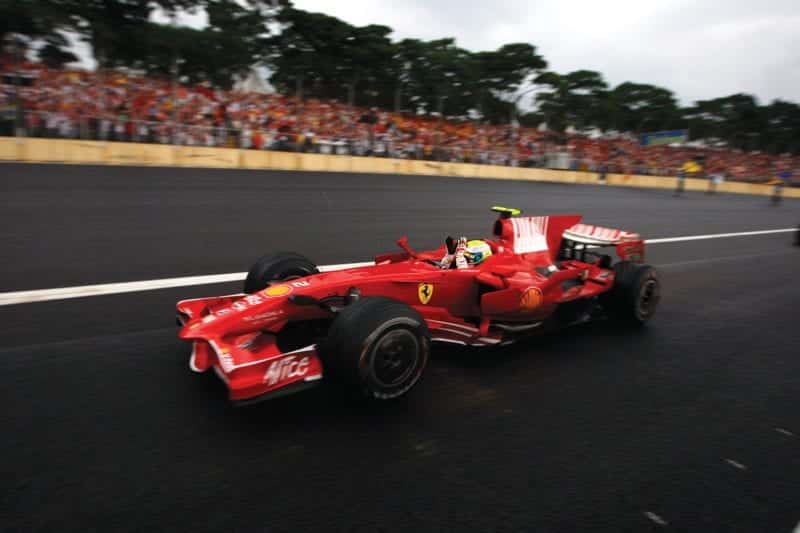
Win in Brazil was not enough to take the 2008 title
Motorsport Images
“Outside the car Fernando and I got on very well and worked effectively together,” he says. “My biggest problem was that there are two Fernandos with completely different personalities – one is Fernando the driver, the other Fernando away from the car. He was always trying to work things to his advantage and he has a very strong personality, which helped him to do that. We have quite different characters – to beat him you have to be absolutely on top of your game. He’s the strongest team-mate I’ve had. I could beat him sometimes in qualifying, but in a race he was always at the maximum on every lap.”
And then there was Hockenheim 2010, when he moved over to allow Alonso through following an unsubtly ‘coded’ radio message [which earned Ferrari a $100,000 fine for breaching a team orders ban that was in place at the time].
“It wasn’t exactly the first time that kind of thing had happened to me at Ferrari,” he says. “I knew the score, but it was barely mid-season and the title race was still completely open. I’d made a great start, was driving a really strong race and it was one year to the day since my accident, so I really wasn’t expecting an instruction like that. But then I got the call, definitely the saddest moment of my career.
“And at the end of 2010, Ferrari lost the championship for a silly reason, by making the wrong strategy call in Abu Dhabi – pitting Fernando to cover Mark Webber, when they needed to cover Sebastian Vettel. As a result, Ferrari still hasn’t won the title since I let Kimi through at Interlagos. I absolutely didn’t want to see the team lose the championship that year, but I did wonder whether it was some kind of karma. What comes around…
“Despite everything, though, I was happy to stay. It was the best option available to me. I know there have always been political struggles within the team, but the bottom line is that it’s still a Ferrari drive – and that’s not an easy thing to give up if you don’t have to.”
He finally moved on after the 2013 season.
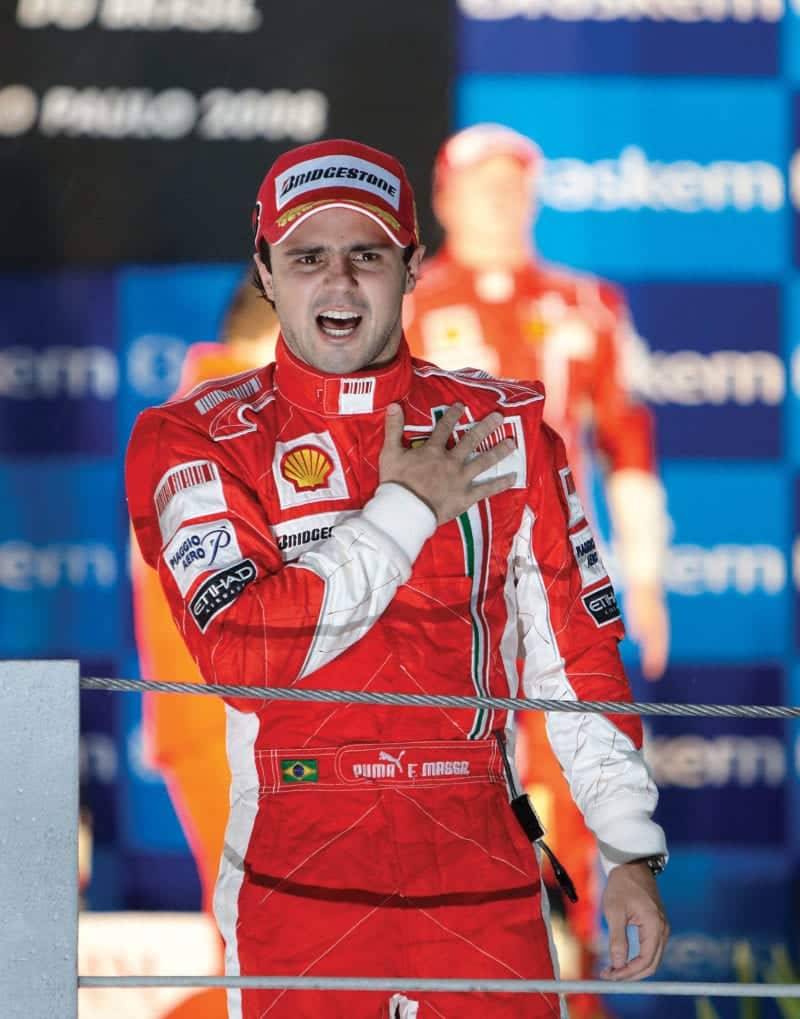
His 2008 Brazil podium salute was fraught with emotion
Motorsport Images
“That was out of my hands,” he says. “Fernando had been fighting with the team – he wanted to leave, but couldn’t because of his contract. He’d been talking to Red Bull, but just after Spa they confirmed that Daniel Ricciardo would be joining in 2014 and I don’t think Fernando knew. He had little choice but to stay with Ferrari – and the team then decided to try and put a bit of pressure on him by re-signing another champion, in Kimi, which made absolutely no difference to my mind because Fernando is much the better driver. But it left no seat for me.
“I enjoyed much of my time with Ferrari and it was a great, unforgettable experience. I was always a big Ferrari fan and I still am. We still have a strong bond – there is plenty of mutual respect. I love the team and I love Italy – my grandfather was Italian, too, so the connection is very strong.”
For the first time in his career, Massa moved into a British racing environment when Williams recruited him to partner Valtteri Bottas.
“I signed for Williams because the team was in the process of rebuilding and wanted an experienced F1 campaigner – but I joined without having a clue that the car would be as good as it was in 2014. I had a few doubts, because I knew things would probably not be as good as they’d been with Ferrari. OK, Ferrari hadn’t won anything for a few years but you always knew that you’d at least have a chance of fighting for the podium. But 2014 proved to be a great season – we finished third in the championship for constructors, which felt like a victory, I came close to winning in Abu Dhabi and scored a few podium finishes. We were third again in 2015, so things worked really well – and I’d probably needed a change to get myself properly remotivated, to rediscover the joy of driving. In my time with Williams I believe it has always finished the championship for constructors in the highest position that the car could achieve.”
Initially, of course, Massa announced that he’d be retiring from F1 at the end of 2016, because Williams had signed Lance Stroll to partner Bottas. The reception he received at Interlagos that season underlined the affection in which he is held by both his compatriots and his sport. Walking back from his crumpled Williams after sliding off the track, he received standing ovations from the grandstands and team personnel as he was accompanied down the pit lane by Raffaela and their young son Felipinho.
“When I crashed I was so disappointed,” he says, “because I wanted to finish as high as possible, maybe do a lap with a Brazilian flag at the end to say thanks to all the fans. I had everything planned, but rain made conditions extremely difficult and then I had a stupid accident. My first thought was, ‘F***ing hell, that’s it, I can’t do any of the things I wanted to do.’ I felt so disappointed, jumped out of the car, took off my helmet and started to head towards the pits – which wasn’t too far. As I was walking I was thinking about my shunt and started to notice the way the people in the grandstands were behaving towards me. That stopped me thinking about what had just happened and made me start focusing on all the other aspects of my career. I began to cry as it all sank in and when I got to the pits I could see all the teams coming out to applaud me. It’s impossible to describe how that felt. It was amazing, a feeling I’d never previously experienced – something I’ll never forget.”
He was swiftly recalled by Williams, when Mercedes poached Bottas to replace the unexpectedly retired Nico Rosberg (“I’m not sure any driver will ever beat my record for the shortest retirement”) and over the year outscored young team-mate Stroll – despite losing a number of potentially decent results, for instance in Spain where a puncture deprived him of a likely fourth. He signed off with a couple of strong drives, notably in Brazil where he narrowly defeated Alonso to take seventh. “I’ve enjoyed being the senior partner and passing on advice,” he says. “I don’t like speaking about myself, but I’m sure that my input has been important for Lance. He had a very difficult start to the year but then made a big step and I’d like to think I played a part in that. I’ve never tried to shield any technical secrets, I’ve always been a team player and I think that’s how it should be.
“Whatever happens after my time in F1, I want to carry on racing because I still love it. Towards the end of 2016 I started looking around. I planned to find a championship I could enjoy. I looked at DTM, WEC and Formula E. DTM is perhaps a bit too political – and I’d had enough of that in F1, so I wanted to find something more relaxed. The best WEC category is LMP1, but I’ve never felt sure about its long-term sustainability. Le Mans? You should never say ‘never’, but I’m not thinking along those lines at the moment and feel most drawn towards Formula E. It’s an evolving championship, there are some very good drivers already involved, a growing number of races, an interesting calendar… I think it would suit me.”
Felipe Massa
career in brief
Born 25/4/81, São Paulo, Brazil
1990-95 & 1997-98 Karting, Brazilian championship 1998-99 Formula Chevrolet, champion in ’99 2000 Formula Renault, European & Italian champion 2001 Winner of Italy-based Euro F3000 series 2002 F1, Sauber 2003 F1, Ferrari test driver 2004-05 F1, Sauber 2006-13 F1, Ferrari; 11 wins (the first at Istanbul, 2006); 2nd in 2008 world championship 2014-16 F1, Williams; retires from Grand Prix racing at the season’s end 2017 F1, Williams; recalled after probably the shortest retirement of all time; retires again 2018 TBC
